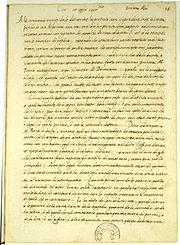
Girolamo Mei
Encyclopedia

Italy
Italy , officially the Italian Republic languages]] under the European Charter for Regional or Minority Languages. In each of these, Italy's official name is as follows:;;;;;;;;), is a unitary parliamentary republic in South-Central Europe. To the north it borders France, Switzerland, Austria and...
historian
Historian
A historian is a person who studies and writes about the past and is regarded as an authority on it. Historians are concerned with the continuous, methodical narrative and research of past events as relating to the human race; as well as the study of all history in time. If the individual is...
and humanist
Humanism
Humanism is an approach in study, philosophy, world view or practice that focuses on human values and concerns. In philosophy and social science, humanism is a perspective which affirms some notion of human nature, and is contrasted with anti-humanism....
, famous in music history for providing the intellectual impetus to the Florentine Camerata
Florentine Camerata
The Florentine Camerata was a group of humanists, musicians, poets and intellectuals in late Renaissance Florence who gathered under the patronage of Count Giovanni de' Bardi to discuss and guide trends in the arts, especially music and drama...
, which attempted to revive ancient Greek music drama. He was born Florence
Florence
Florence is the capital city of the Italian region of Tuscany and of the province of Florence. It is the most populous city in Tuscany, with approximately 370,000 inhabitants, expanding to over 1.5 million in the metropolitan area....
, and died in Rome
Rome
Rome is the capital of Italy and the country's largest and most populated city and comune, with over 2.7 million residents in . The city is located in the central-western portion of the Italian Peninsula, on the Tiber River within the Lazio region of Italy.Rome's history spans two and a half...
.
Mei was the first European after Boethius
Anicius Manlius Severinus Boethius
Anicius Manlius Severinus Boëthius, commonly called Boethius was a philosopher of the early 6th century. He was born in Rome to an ancient and important family which included emperors Petronius Maximus and Olybrius and many consuls. His father, Flavius Manlius Boethius, was consul in 487 after...
to do a detailed study of ancient Greek music theory. He compiled his findings in a major treatise, De modis musicis antiquorum (not formally published, but written 1568 to 1573). Many of his findings he communicated to Vincenzo Galilei
Vincenzo Galilei
Vincenzo Galilei was an Italian lutenist, composer, and music theorist, and the father of the famous astronomer and physicist Galileo Galilei and of the lute virtuoso and composer Michelagnolo Galilei...
through an extensive correspondence; this information was decisive in the formation of the new musical style which was developing in Florence at the end of the 16th century, the new recitative style (stile recitativo) from which developed monody
Monody
In poetry, the term monody has become specialized to refer to a poem in which one person laments another's death....
, the first music dramas, and eventually opera
Opera
Opera is an art form in which singers and musicians perform a dramatic work combining text and musical score, usually in a theatrical setting. Opera incorporates many of the elements of spoken theatre, such as acting, scenery, and costumes and sometimes includes dance...
. Galilei and the others in the Florentine Camerata were determined to revive the musical style of ancient Greek drama, and while they may have been mistaken, ultimately, in how it was actually performed, they began, using ideas from Mei, one of the greatest revolutions in music history.
Mei also edited and annotated the tragedies of Aeschylus
Aeschylus
Aeschylus was the first of the three ancient Greek tragedians whose work has survived, the others being Sophocles and Euripides, and is often described as the father of tragedy. His name derives from the Greek word aiskhos , meaning "shame"...
and Euripides
Euripides
Euripides was one of the three great tragedians of classical Athens, the other two being Aeschylus and Sophocles. Some ancient scholars attributed ninety-five plays to him but according to the Suda it was ninety-two at most...
, as well as many other works by classical writers.

